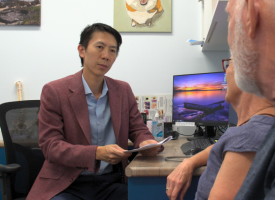AMA Transcript - MBS Review Taskforce and visit to Gallipoli
Transcript: AMA President A/Prof Brian Owler, 4BC Radio with Clare Bake, 22 April 2015
Subject: MBS Review Taskforce and visit to Gallipoli
CLARE BAKE: Now, Health Minister Sussan Ley has ruled out the controversial co-payment for patients. She's in Sydney today announcing an examination of over 5000 medical services funded under Medicare and while this is pretty good news for some, AMA President, Professor Brian Owler, says the discussions about the policy have derailed looking at other options. He's on the line now. Thanks for joining us Professor.
BRIAN OWLER: Hi, how are you?
CLARE BAKE: I'm very well thanks. Is that right, am I quoting you correctly?
BRIAN OWLER: Not quite. I mean, we're very supportive of this process. We've been in discussions with the Minister for some time. I think the derailment happened over the past 12 months when we've had this discussion about the GP co-payment which, of course, came without any consultation. Now, Minister Ley has done the right thing. She has been consulting with the profession and we're happy to support a process that is clinician-led, that's not just about savings but actually trying to make sure that we get a modernised Medicare schedule of benefits which, of course, is what the Government actually gives the patient, it's their rebate at the end of the day.
CLARE BAKE: Is clinician-led the key here?
BRIAN OWLER: It is because what we have seen in the past is where there have been other processes where it's been top-down. The departments have tried, essentially, to have a hit list of procedures that they wanted to reduce the patient rebate for or to take off the schedule and what we need to do is make sure that the professions are engaged in this process, that it looks at the evidence and make sure that we - where there procedures that don't need to be on the schedule, they can come off, but we also know that there are many procedures that have struggled to be put on the schedule and we need to be looking at those sorts of issues as well.
CLARE BAKE: Well, yeah. People listening now might think that their uncommon ailment might be under threat.
BRIAN OWLER: Well, that's right and so we don't want to see any change to the schedule which limits patient's access to medical services because if it comes off the schedule it means it's no longer really available to many members of the public and that's not a situation we want. Now, having said that, look, there are inefficiencies in the system, there are improvements that can be made and the schedule has really lagged behind, I guess, contemporary medical practice. So, it is about modernising it but it shouldn't be seen as the primary objective of saving money for the Government. This is about making sure we get the best outcomes for our patients.
CLARE BAKE: Well, the taskforce is charged with weeding out low-value, ineffective and overpriced procedures and tests. That does sound like money is a big issue.
BRIAN OWLER: Well, there's no doubt that the Government wants to save money. I mean, that's very clear and they've been upfront about that all along and where there are procedures where the evidence is poor in terms of particular indications – clinical – indications then we have to question whether they are covered under the schedule. But I think what we need to do is make sure that the clinicians, the doctors that are actually doing these procedures, who are involved in that process, that they can actually input and I think this is something that the profession is very happy to do and I'm sure that the specialist societies and the colleges will be keen to be involved in this process.
CLARE BAKE: And for people now being very anxious, low income earners, about the co-payment, can they relax and for how long?
BRIAN OWLER: I think they can relax about the GP co-payment. I mean, that initiative is certainly off the table and I don't see it coming back in any way in the near future. I think one of our reasons for being so, I guess, against it was the fact that it was going to threaten many low income earners and particularly those with chronic diseases and other illnesses. So, I think people can be rest assured that their access to services is going to be maintained. The only concern that's still there is this indexation freeze and that impacts GP services and the ability to bulk-bill as well.
CLARE BAKE: Okay. Well, the Minister's saying that there will be no major changes to be introduced until at least 2016. Does that add to that stress?
BRIAN OWLER: Well, the Prime Minister and the Minister have both said to me and publicly that they're not going to institute any changes without the broad support of the medical profession. They know that it was a mistake to have done so in the last Budget. I'm not expecting any surprises in this Budget but we'll be watching it very closely and I think, as for 2016, of course, that'll be essentially an election year so I think that will be the test of any policy that gets put up.
CLARE BAKE: That timing's good for us, isn't it really?
BRIAN OWLER: It is, yes [laughs].
CLARE BAKE: What will the Primary Health Care Advisory Group be focusing on?
BRIAN OWLER: So, one of the things that we know for the future of out health care system is that we need to do a better job of looking after chronic diseases. Now, there are systems in place to look after chronic diseases in terms of team care arrangements and chronic disease item numbers for GPs but the forums that we held - and I know from Sussan Ley's consultations as well, we've all said that there can be improvements there. So, Steve Hambleton who is my predecessor, will be leading that aspect and looking at ways that they can restructure some of those items to get better value, better outcomes for patients, and I think that's something that we ultimately support.
CLARE BAKE: What did you think - what would be the best possible outcome of this taskforce for patients?
BRIAN OWLER: Well, I think at the end of the day we need to see a schedule that reflects modern medical practice that allows people to access medical services for common ailments and make sure that that access is maintained. But we also need to make sure that, I think, the way that we run our primary care needs to focus - to do a better job on prevention and also chronic disease management so that we reward those GPs that are doing that sort of work much better than what we do now.
CLARE BAKE: Just on a side note, you guys - no wonder you're pretty smart, 5500 medical services and you have to be across all of those. It's a big job. Good grief.
BRIAN OWLER: Well, thankfully it covers lots of speciality areas as well. So, we don't have to be across every single one, but we tend to focus on our own area of practice, and that's why we need quite a number of people engaged in this process because it's not something that individuals can do themselves, we need all of the profession on board with this process.
CLARE BAKE: Now back to you again. I believe you're on your way to Gallipoli. This is an amazing opportunity.
BRIAN OWLER: Well, yes. I was very surprised to get an invitation from the President of the Turkish Medical Association. The Turks, they see this as a very significant event for them as well. So I'll be going over to meet with him and his colleagues, and the New Zealand Chair of their medical association is going there as well. So we won't be going to the main event, we'll be going to a service just across the water in Canakkale, and I think reflecting and talking about particularly medical care in not only the Gallipoli Campaign but also in other aspects of war as well.
CLARE BAKE: It's a big trip for Australians. Have you been to Gallipoli before?
BRIAN OWLER: No I haven't. And I think it's obviously such a significant event in our history, and the sacrifices that were made in that area on all sides. So I think it will be a very significant occasion, and I think it will be one of those things that you look back on your lifetime and reflect on is a fantastic thing to have had the opportunity to do, and I'm very privileged to be able to go and do it.
CLARE BAKE: Pretty poignant when you have a look at those stories over there for you to witness how people in the medical profession would have had to cope with that kind of injury under those circumstances, it would be just mind-blowing.
BRIAN OWLER: Incredible. You know the doctors and, of course, the many nurses that were there as well and the conditions that they worked under, I mean, it was an era that was essentially pre-antibiotic and the fact that people survived so many of those injuries is a great testament to the people that actually provided all of that sort of health care.
CLARE BAKE: Well we wish you luck, safe journey, and be there representing us. Thank you so much. So many people here in Queensland and Australia would love to be there. So congratulations and I hope you have a great trip.
BRIAN OWLER: Thank you very much.
CLARE BAKE: Professor Brian Owler, who's the AMA President, who's going to be part of the Australian and New Zealand people going to a service in Canakkale, just across the strait from Gallipoli too.
22 April 2015
CONTACT: John Flannery 02 6270 5477 / 0419 494 761
Odette Visser 02 6270 5412 / 0427 209 753



